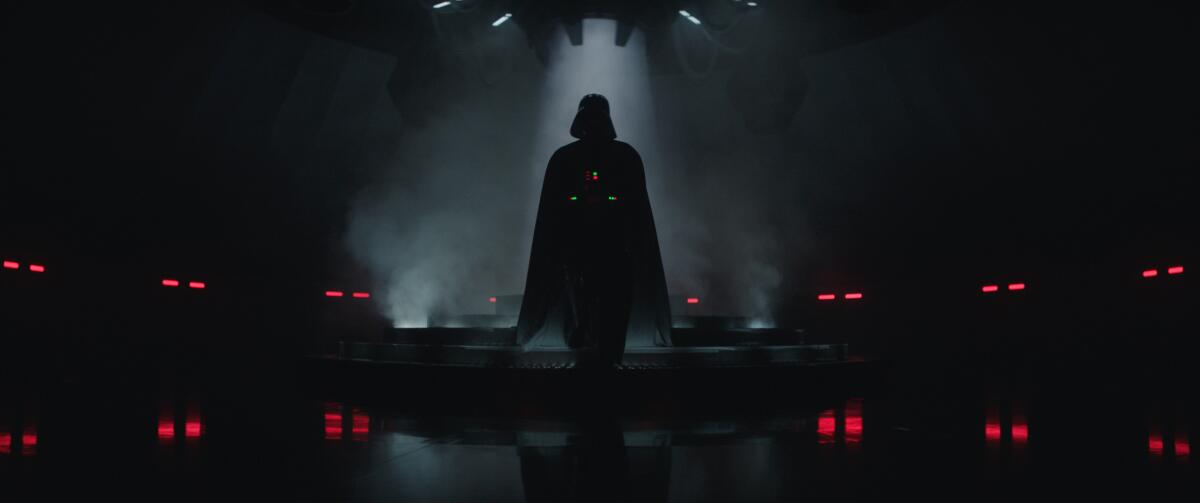Disney, Universal sue AI company for copying Minions, Avengers and ‘Star Wars’ characters

- Share via
Walt Disney Co. and Universal Pictures sued an influential artificial intelligence image generator for copyright infringement Wednesday, marking a major step in Hollywood’s fight against certain uses of generative AI.
The lawsuit, filed in U.S. District Court in Los Angeles, said the AI company Midjourney generates images that “blatantly incorporate and copy” the movie studios’ famous characters, including those from billion-dollar franchises such as “Star Wars,” Marvel and the “Despicable Me” and “Minions” world.
This is the first time major studios have brought the battle against alleged AI-enabled intellectual property theft to the courtroom. Disney and Universal were joined by subsidiaries in the suit, including Marvel, Lucasfilm, 20th Century and DreamWorks Animation.
They called Midjourney a “quintessential copyright free-rider and a bottomless pit of plagiarism,” and contend that the company uses its images featuring copyrighted characters to market and promote its service.
Disney has consolidated ownership of Hulu, boosting its streaming portfolio. The Burbank giant will pay Comcast more than $9 billion for its stake in the streaming service behind “Only Murders in the Building.”
Disney and Universal claim Midjourney ignored their requests to stop infringing on their copyrighted works. The companies argued that Midjourney already has preventative measures in place to block the creation of images with violence or nudity and that it could implement similar measures to prevent replications of recognizable and copyrighted works.
Representatives for Midjourney did not immediately respond to a request for comment.
Through more than 30 examples, the 110-page lawsuit includes images created from Midjourney prompts and places the results next to images from Disney and Universal’s movies.
The suit included Midjourney-generated images of Yoda, Darth Vader, Iron Man, the Hulk and the animated characters from “Frozen,” “The Simpsons,” “Shrek” and “Kung Fu Panda,” which were nearly identical to corresponding pictures from the studios.
The coloring, animation style and specific details, such as the logos on the side of Lighting McQueen and Buzz Lightyear’s space suit, closely resemble the original works.
“Our world-class IP is built on decades of financial investment, creativity and innovation — investments only made possible by the incentives embodied in copyright law that give creators the exclusive right to profit from their works,” said Horacio Gutierrez, Disney’s chief legal and compliance officer, in a statement.
“We are bullish on the promise of AI technology and optimistic about how it can be used responsibly as a tool to further human creativity,” his statement continued. “But piracy is piracy, and the fact that it’s done by an AI company does not make it any less infringing.”
Kim Harris, general counsel for Comcast-owned NBCUniversal, said in a statement that “theft is theft regardless of the technology used.”
“Creativity is the cornerstone of our business,” Harris said. “We are bringing this action today to protect the hard work of all the artists whose work entertains and inspires us and the significant investment we make in our content.”
Google is funding short films that move away from AI doomsday scenarios and examine potential benefits of the technology.
Creatives in Hollywood have long expressed concern about the rapid development of generative AI with text, images, audio and video. Worries over unauthorized use of generative AI were a sticking point in the historic double strike by actors and writers in 2023.
In a 2022 interview with The Times, Midjourney’s founder and CEO David Holz said he viewed the image service as a way for artists to have the speed of their process match the speed of their imagination.
“It’s really easy to look at something from far away and say it’s scary,” he said. “When people actually use it, the attitudes are very different. It doesn’t feel like something that’s trying to replace you. When you use it, it very much feels like an extension of your own mind.”
More to Read
Inside the business of entertainment
The Wide Shot brings you news, analysis and insights on everything from streaming wars to production — and what it all means for the future.
You may occasionally receive promotional content from the Los Angeles Times.













